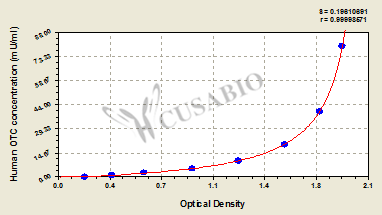The Human Ornithine carbamoyltransferase, mitochondrial (OTC) ELISA kit is an essential tool for researchers in the field of metabolism. This high-quality kit is designed to accurately detect and quantify the Ornithine transcarbamylase, mitochondrial protein (OTC) in a range of human samples including serum, plasma, tissue homogenates, and cell lysates.
With a detection range of 1.25 mU/mL-80 mU/mL and a sensitivity of 0.312 mU/mL, this kit provides reliable and precise results in a short assay time of 1-5h. The sample volume required for analysis is minimal, only 50-100ul, making it a cost-effective and efficient solution for detecting OTC levels in human samples.
The OTC ELISA kit operates on a sandwich assay principle, providing a quantitative measurement of OTC protein in your samples. The detection wavelength for this assay is 450 nm, and it has been optimized to work with samples from human species. This kit is an ideal tool for researchers studying metabolism and can provide accurate and reproducible results.






